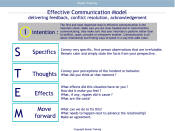|
Intention:
The first and most
important step in effective communication is the intention
check. Make sure you are clear headed and in control before
communicating. Also make sure that your intention is positive
rather than
to belittle, upset, provoke or overpower another. Communication
is all about relationship and finding ways to speak in a way
that adds value.
 Specifics: Specifics:
Convey very specific, first person observations that are
irrefutable. Remain calm and simply state the facts from your
perspective.
Thoughts:
Convey your perceptions
of the incident or behavior.
What did you think at that moment ?
Effects:
What effects did this situation have on you ?
How did it make you feel ?
What, if any, ripples did it cause ?
What costs are there?
Move Forward:
What needs to happen next to advance the relationship?
What can we do to fix this?
Make an agreement.
Use this model to resolve conflicts,
make an apology or to make an acknowledgement. The model can
also be used as a framework for asking great questions. Example Situation:
You and your friend made plans to go to the 7:30pm movie.
You arrived early, bought both tickets and waited patiently for
your friend. Your friend did not call and showed up 30 minutes
late...the movie had already started.
Here's how to handle it:
S - We agreed to be here
for the 7:30pm movie. I purchased two tickets and you were 30
minutes late. You did not call.
T- I think I need an
explanation and that a call would have been considerate.
E- I feel disappointed. I
wanted to see this movie with you. I also feel disrespected
because my time is as valuable as yours. I purchased two tickets
that cost $15.
M - Please reimburse me
for your ticket and lets agree to be on time when we make plans
and to call one another if we are running late.
Simple. Clear. Focused on
building relationship.
|